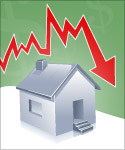
With presidential elections coming up next year, and Osama Bin Laden now dead, we're going to be hearing a lot of political talk about the old Bill Clinton mantra,“It's the economy, stupid.” So, let's look at the basics.
“The economy” means jobs. From the high point of the expansion that ended in 2007, to the low point of the recession in early 2010, the economy lost about 9 million jobs. Almost 2 million of those jobs have been recovered and the economy is adding new ones at a rate of 1.5 million a year, but even if this rate improves, that's only another 2 million before election time, still leaving us down 5 million jobs from where we were.
The culprit, of course, is ourselves. Instead of freely spending money like we did, we've been putting it in the bank, an extra $400 billion a year. That equals a lot of jobs, even if some of them are in China. In the long run this is a good thing because we had gone over our eyeballs in debt, but in the short run it means the economy will grow only slowly.
The latest data on home prices show a sharper fall this year than we'd seen in late 2010, when the average drop had slowed to an annual rate of just 1 percent. Prices in the first quarter were down 3 percent.
Cause for alarm? Or just a recognition that the rapid decrease from 5 percent in 2009 to 1 percent in late 2010 was too good to be true. Whether due to government programs or statistical variation [after all, the stats are based on a much smaller number of home sales], the 1 percent didn't accurately reflect the fact that millions of homes built during the boom are still sitting around empty.
Whether the national average is 1 percent or 3 percent doesn't matter anyway if you're in a market where prices fell 10 percent. That includes Boise, Phoenix, Las Vegas, Tampa, and a bunch of smaller Florida markets. On the other hand, it looks like almost half the 315 markets we cover have bottomed out, including Hartford, Bethesda, Newark, New York, Louisville, Boston, and San Jose. Don't look for strength in those markets for a while, but expect more markets to join them as the year progresses.



